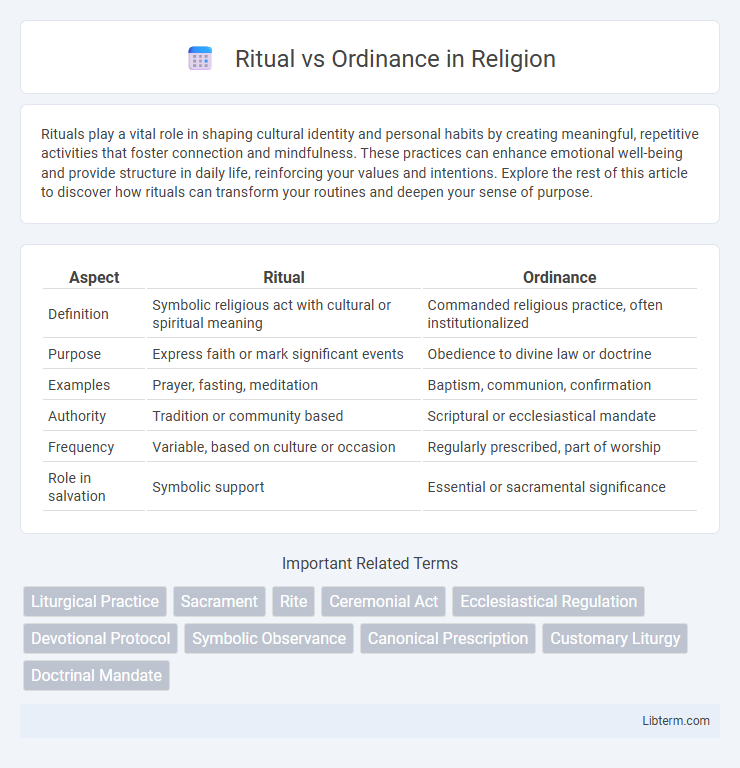Rituals play a vital role in shaping cultural identity and personal habits by creating meaningful, repetitive activities that foster connection and mindfulness. These practices can enhance emotional well-being and provide structure in daily life, reinforcing your values and intentions. Explore the rest of this article to discover how rituals can transform your routines and deepen your sense of purpose.
Table of Comparison
| Aspect | Ritual | Ordinance |
|---|---|---|
| Definition | Symbolic religious act with cultural or spiritual meaning | Commanded religious practice, often institutionalized |
| Purpose | Express faith or mark significant events | Obedience to divine law or doctrine |
| Examples | Prayer, fasting, meditation | Baptism, communion, confirmation |
| Authority | Tradition or community based | Scriptural or ecclesiastical mandate |
| Frequency | Variable, based on culture or occasion | Regularly prescribed, part of worship |
| Role in salvation | Symbolic support | Essential or sacramental significance |
Understanding Rituals and Ordinances
Rituals and ordinances represent structured practices within religious traditions, where rituals often encompass symbolic actions that convey spiritual meaning without necessarily requiring formal authorization. Ordinances, by contrast, are prescribed acts instituted by religious authority, serving as essential rites like baptism and communion that signify covenantal commitments. Understanding the distinction highlights that rituals foster communal identity and personal reflection, while ordinances function as mandated ceremonies integral to doctrinal observance and salvation theology.
Defining Rituals: Meaning and Purpose
Rituals are structured, symbolic actions performed within specific cultural or religious contexts to convey meaning, reinforce beliefs, and foster communal identity. They serve purposes such as marking significant life events, creating a sense of continuity, and connecting participants with the sacred or transcendent. Unlike ordinances, which are formalized acts often mandated by religious authority, rituals can be more fluid and interpretive, emphasizing participation and shared experience.
Unpacking Ordinances: Core Elements
Ordinances are sacred practices in many religious traditions, characterized by specific rituals that convey spiritual significance and divine mandates. Core elements include symbolic actions, prescribed words or prayers, and designated participants or officiants, all structured to reinforce communal identity and faith adherence. These components work together to embody theological principles, ensuring continuity and deepening believers' connection to their faith.
Historical Context of Rituals and Ordinances
Rituals and ordinances have distinct historical contexts rooted in religious and cultural traditions, with rituals often emerging as symbolic acts representing deeper spiritual meanings across ancient civilizations such as Egypt, Mesopotamia, and India. Ordinances historically developed alongside formalized religious institutions, especially within Christianity, where they function as prescribed ceremonies like baptism and communion to signify covenantal commitments. Both rituals and ordinances have evolved over centuries, reflecting broader social, theological, and legal frameworks that shaped their practice and interpretation.
Key Differences Between Rituals and Ordinances
Rituals are symbolic actions or ceremonies performed to express beliefs, often deeply rooted in cultural or religious traditions, while ordinances are formal, authoritative acts usually instituted by a religious organization or government with binding significance. Rituals emphasize personal or communal meaning and participation, whereas ordinances often carry legal or doctrinal authority and are considered essential for membership or spiritual status. Key differences include the voluntary nature and symbolic interpretation of rituals versus the obligatory, codified requirements of ordinances.
The Role of Authority in Ordinances
Ordinances are authoritative acts established by a recognized religious leadership to convey divine commands, distinguishing them from rituals that are often symbolic or cultural practices. The role of authority in ordinances is pivotal because it legitimizes these practices as obligatory, binding participants to specific theological principles within a faith community. This authoritative mandate ensures ordinances maintain doctrinal integrity and unify believers under a structured hierarchy.
Symbolism in Rituals Versus Ordinances
Rituals often embody symbolic actions that convey deeper spiritual meanings and cultural values, serving as a means to connect participants with sacred traditions and collective identity. Ordinances typically represent prescribed ceremonies or formal acts established by religious authority, emphasizing adherence to doctrinal commands rather than symbolic interpretation. The distinction lies in rituals prioritizing symbolic expression and experiential engagement, while ordinances focus on institutionalized religious obligations and spiritual requirements.
Rituals and Ordinances Across Religions
Rituals and ordinances serve as foundational practices across diverse religions, embodying spiritual significance and communal identity. Rituals often encompass symbolic actions, ceremonies, and rites of passage that connect believers to sacred narratives and divine principles, while ordinances typically refer to formal acts prescribed by religious authority, such as baptism in Christianity or Salah in Islam. Understanding these practices reveals the intricate ways faith traditions maintain continuity, express devotion, and structure moral life.
Impact on Community and Personal Spirituality
Rituals foster community cohesion by creating shared experiences that reinforce collective identity and cultural heritage, while ordinances emphasize personal commitment and spiritual discipline through formalized acts of faith. The communal aspect of rituals cultivates belonging and mutual support, enhancing social bonds within the group. Ordinances, often considered sacred and binding, deepen individual spirituality by marking significant religious milestones and affirming one's relationship with the divine.
Contemporary Relevance: Rituals vs Ordinances
Rituals, often symbolic acts rooted in cultural or religious traditions, provide a sense of identity and continuity within communities, fostering social cohesion in contemporary settings. Ordinances, typically formalized rules or laws enacted by governing bodies, ensure order and standardize behavior across societies. The contemporary relevance of rituals lies in their ability to nurture communal bonds, while ordinances maintain societal structure and legal accountability.
Ritual Infographic

 libterm.com
libterm.com